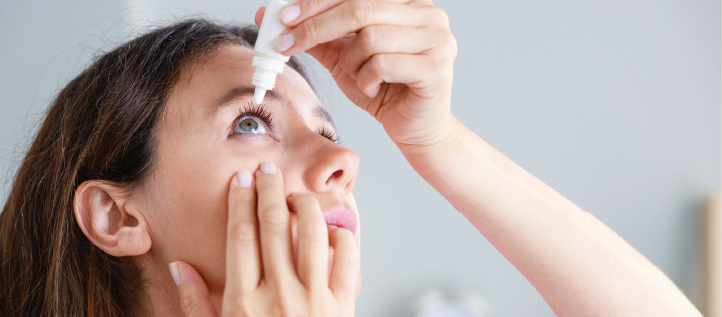What Causes Dry Eyes?

Dry eye is surprisingly common. Basically, it can develop if the quantity or quality of your tears falls short, so your eyes aren’t as lubricated as they should be.
Symptoms include discomfort, soreness, burning, stinging, redness, blurry vision, and itchiness, to name a few. So you can imagine how important it is to have this condition properly diagnosed and treated ASAP.
While the risk of this condition increases with age, there are several other causes that lead to dry eyes, and we’ve outlined them below. If you have any symptoms or you’ve been diagnosed with dry eye but your treatment isn’t working, be sure to consult with your eye doctor to get the help that you need to feel relief.
Cause #1: When Your Eyes Don’t Produce Enough Tears
Tears aren’t only around when you cry; they help keep your eyes moist and comfortable all the time. Therefore, your eyes might become dry if your body stops producing an adequate amount of tears. What could cause that to happen? Well, a variety of factors might be at play.
Getting older is one, but various medical problems (such as rheumatoid arthritis, Sjogren's syndrome, thyroid disorders, diabetes, a deficiency in vitamin A, and lupus) might also be to blame. Even damage to the tear gland could be another reason why tear production is lacking.
Also, if you’re taking medications for other conditions, such as a decongestant, antidepressant, antihistamine, or hormone replacement therapy, dry eye might be a side effect.
Note: Women might be more prone to developing this condition, and it might come about as a result of hormonal changes, such as during pregnancy or menopause.
Cause #2: A Problem with the Composition of Your Tears
Your eyes’ tear film has multiple layers consisting of mucus, water, and oil, and they all work together. Because every layer helps keep your eyes moist, an issue with any of the layers might cause the eyes to become dry. Makes sense, right?
For example, the oils help provide lubrication, while also preventing excessive evaporation of tears. On the other hand, the mucus layer helps ensure the tears that are produced are spread nicely across the eye.
These layers are produced by various glands, including the lacrimal glands and meibomian glands, as well as the goblet cells that are within the conjunctiva. So if there’s a problem in these areas, it may affect the tear film and result in the symptoms of dry eye.
Cause #3: Problems with Your Eyelids
If you have a condition, such as entropion or ectropion, that doesn’t allow your eyelids to close properly, dry eye might occur.
Another condition, known as blepharitis, which is inflammation of the eyelids, might also be to blame.
Receiving the appropriate treatment for your eyelids might be all you need to get relief from the dryness that makes your eyes feel uncomfortable, so be sure to consult with a physician for help.
Cause #4: Too Much Tear Evaporation
An increase in the evaporation of tears is yet another cause of dry eye.
This might be the result of the environment that you’re in, particularly if the air is dry, if there’s a lot of smoke, or if it’s windy. Even being on an airplane might cause your eyes to feel dry (fun fact: frequent fliers might be at a greater risk of developing dry eye).
Also, if you’re indoors with the ceiling fan on, if you’re using forced air heat, or if the air conditioner is on, you might notice that your eyes feel dry because the lower humidity may lead to increased tear evaporation.
It doesn’t stop there: certain activities might even cause you to blink less often, resulting in drier than normal eyes. This can happen when you’re really focused on something, like when you’re reading a book or when you’re working on a mobile device or computer. Just be sure to take breaks to rest your eyes regularly, as doing so might help prevent problems before they start.
Talk to Your Doctor to Get to the Bottom of Your Eye Discomfort
If your eyes feel dry and uncomfortable, it’s best to talk to your eye doctor, who can figure out what the culprit is. And with the right vision insurance, you don’t have to hesitate to get the advice and treatment that you need right away, so definitely consider checking out the plans that are available.
In the end, the solution to this common problem might be something as simple as a lifestyle change, such as using the computer for shorter spans of time, reducing the number of hours that you wear contact lenses, or quitting smoking and avoiding secondhand smoke. Or, if your dry eyes are a side effect of a medication, you might need to switch to a different option. Once you find the right remedy, you’ll feel loads of relief and your eyes will thank you for it.
Sources:
- https://www.mayoclinic.org/diseases-conditions/dry-eyes/symptoms-causes/syc-20371863
- https://www.allaboutvision.com/conditions/dryeye-syndrome.htm
- https://www.nei.nih.gov/health/dryeye/dryeye
- https://www.aoa.org/healthy-eyes/eye-and-vision-conditions/dry-eye
- https://www.aao.org/eye-health/diseases/what-is-dry-eye
- https://www.webmd.com/eye-health/eye-health-dry-eyes#1
